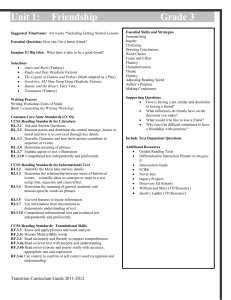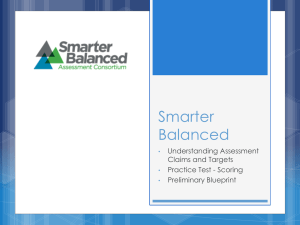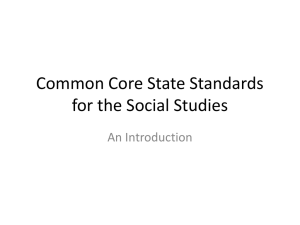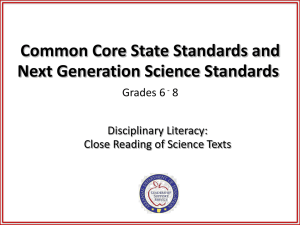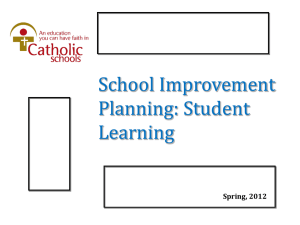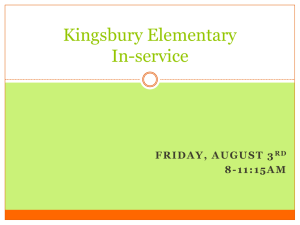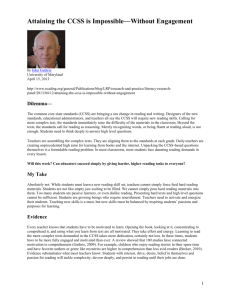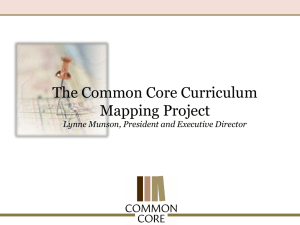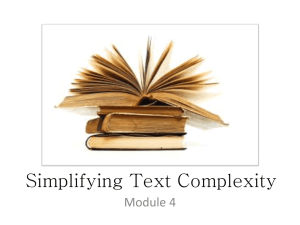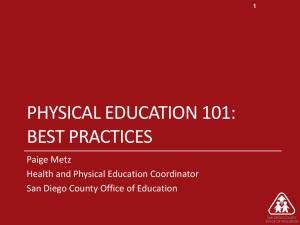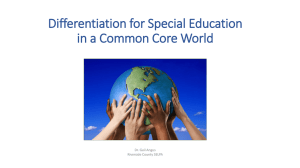SDCOE_October 2014_Featured Speaker
advertisement
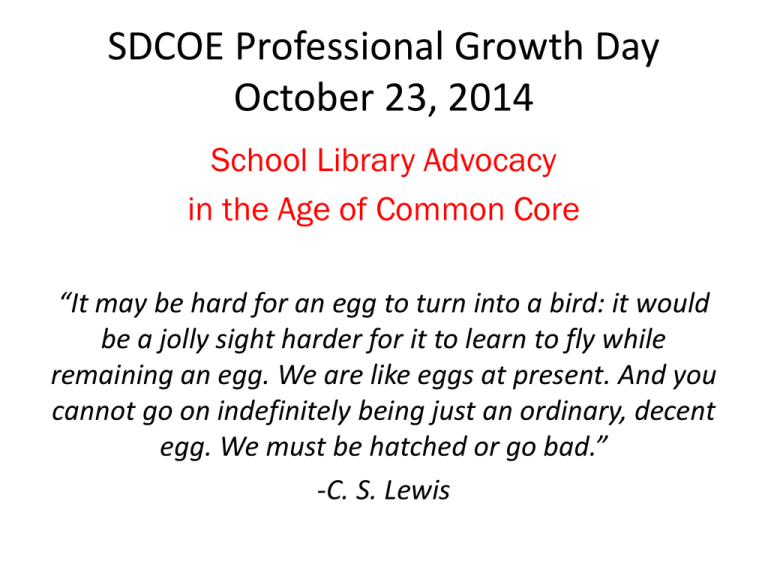
SDCOE Professional Growth Day October 23, 2014 School Library Advocacy in the Age of Common Core “It may be hard for an egg to turn into a bird: it would be a jolly sight harder for it to learn to fly while remaining an egg. We are like eggs at present. And you cannot go on indefinitely being just an ordinary, decent egg. We must be hatched or go bad.” -C. S. Lewis Five Ways to be a School Library Advocate in the Age of CCSS Dr. Virginia Loh-Hagan virginialoh@cs.com Dr. Virginia Loh-Hagan • Education: – University of Virginia – SDSU-USD • Teaching Experience: – K-8 teacher in Charlottesville, La Mesa-Spring Valley, San Diego, Chula Vista – ELLs, SPED, urban, online 4-Book Contract – Teacher Educator: SDSU, USD, UPitt, NU, AU with Cherry • Research Fellow: IFL at UPitt Lake! • Publishing Experience: – The Jade Dragon (Candlewick Press, 2008) – 35 Strategies for Guiding Readers Through Informational Texts (Guilford Press, 2010) – Paper Son (Sleeping Bear Press, 2013) I am a Library Advocate! I financially support libraries! I’m an author! I was a Library Board of Trustee. I’m a card-carrying member! So what? There are many ways to advocate for libraries and for librarians! But, what does it mean to be a library advocate today? We need to be warriors because there is a problem! Let’s compare effects: In the U.S., how many people are affected by good libraries? “The link between strong school library programs and student achievement is well documented. Over the past 20 years, numerous studies have shown that elementary schools with at least one full-time certified teacher-librarian performed better on state tests. In a 2010 study conducted in Colorado, more children scored "proficient" or "advanced" in reading in schools with a full-time, credentialed librarian than those without.” VERSUS In the U.S., how many people are affected by ebola? Messaging Problem: 100% of people in U.S. think they have ebola but… Get the word out!!! “The problem is that people don’t know precisely what librarians do these days.” P.S. Major Problem: Relevancy Yes, we are relevant! Libraries are more than just shelves of books! Solutions: Relevancy • Create a communication strategy: Let your school community stakeholders know ALL that your library has to offer. – Community Center – Programs and Services • Offer something – Fight for your job! – Increase visibility – Increase programs and services – Become invaluable "The common standards are the best opportunity we've had to take an instructional-leadership role in the schools and really to support every classroom teacher substantively.” -Barbara Stripling, former President of ALA Opportunities • Opportunity to move from position of support to leadership. • Opportunity to use assets: Knowledge of books, digital resources, and research. • Opportunity to be an expert. • Opportunity to be popular. • Opportunity to increase your resources. From Grocery Store to Kitchen: • “…we need to stop thinking of the library as a grocery store—a place to ‘get stuff’—and start thinking of it as a kitchen—a place to ‘make stuff’….” • “The library’s resources have changed, but not its mission: teaching people to effectively access information to meet their needs.” • “A well-designed and widely used library is a physical indicator that a school embraces certain values regarding information: that multiple points of view have value; that teaching kids how to think, not just memorize, is crucial; and that self-exploration should be encouraged.” Source: Johnson, D. (2013, October). “The new school library.” Educational Leadership. Five Ways to be a School Library Advocate in the Age of CCSS #1: Be a communications strategist. CCSS is everywhere! •Teachers are clicking on anything “CCSS.” •Everyone is jumping on the bandwagon. • Provide teachers with a regularly updated list of programs and services. • Create monthly newsletters/blogs with CCSS connections. • Send media releases. • Use social media. #CommonCoreAtYourLibrary #2: Be an invaluable support for teachers. CCSS requires teachers: • to use more informational/nonfiction texts • to use complex texts • to push students to support their thinking with evidence. • Develop text sets. • Create CCSS displays using texts. • Create annotated bibliographies. • Host PD workshops. • Curate PD resources. • Provide media and visual literacy lessons. • Provide units, resources, book lists, etc. Great resource for high-quality nonfiction books! #3: Be an invaluable support for students. CCSS requires students to: • read widely and deeply • read complex texts • research and cite evidence. • review sources • demonstrate mastery via performance-based assessments • Create book talks via webtools. • Host study hall sessions. • Create student-friendly research guides. • Host author visits. • Provide materials and tools for assignments. – Create communication pathways with teachers. #4: Be a networked expert. CCSS requires us to be knowledgeable about: • Text complexity • Texts • Performance-Based Assessments • Research • CCSS Resources • Best Practices • Attend conferences and workshops (like SDCOE PGD) – learn, network, and then SHARE resources! • Join professional orgs like ALA. • Know people who know. “[Librarians have to] have the flexibility to work with the rest of the staff, to share research and best practices…A lot of the librarian’s practice ends up in the classroom. You might think that the success of a class is all to do with the teacher, but a lot of support comes from the media center.” -Mike Swank, principal of Avon High School (IN) #5: Be a grassroots community builder. CCSS requires us to help students become college and career ready • Provide resources and services to parents and community members. – Host focus groups. • Build a professional community of learning. • Become a community center. Bottom Line: Make sure everyone knows that you are RELEVANT! Come find out why historical fiction is SEXY!!! Analysis of Historical Fiction: Close Reading Strategies Session 1:00-1:45 Session 1:50-2:35 Books - Yellow Book Road Any questions? virginialoh@cs.com
